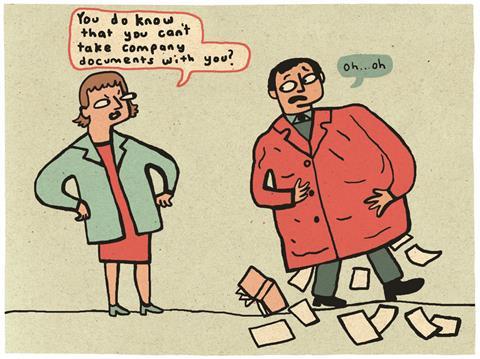Firms are getting fidgety about the sensitive information that goes out the door when employees leave to work for rivals

Thinking of swapping jobs to go to another firm? This is the story of two chaps who swapped to a competitor, and there is umbrage. It could happen to you.
Oliver Luard and John Maddams are employed now by McCarthy & Stone, the retirement homes enterprise. That company is the largest in that end of the construction and development market. The second largest is Churchill Retirement Living. Both of them employ teams of land buyers, whose job it is to identify sites and to secure their purchase at the right price. Luard and Maddams are land buyers who both first worked for McCarthy & Stone, and then went to Churchill, then back to McCarthy & Stone.
Buying land, I don’t have to tell you, is a sensitive business. It’s not wise to broadcast what handsome plots you are casting your eye over for a block of retirement homes. You can imagine some long faces when a land buyer moves to a strong competitor. He takes, at least between his ears, useful information.
I suspect that Churchill decided to put its foot down. It has begun court proceedings mainly against its two ex-employees, together with McCarthy & Stone. Time to take a stand against what it believes is confidential information going out of the door.
Churchill says that Luard and Maddams have committed breaches of confidence when they moved companies. There is, says Churchill, an “implied contractual duty of confidence in relation to the confidential information to which they had access”. That’s a standard headline duty which has been approved by the courts for umpteen years. What I mean is that it could easily be said of anyone moving to a competitor. Watch out.
Buying land, I don’t have to tell you, is a sensitive business. It’s not wise to broadcast what handsome plots you are casting your eye over for a block of retirement homes
Don’t run off with the idea that these chaps bumped into restrictive covenants. As is often the case, there were none. Their contract barred them during their current employment from assisting a competitor, required them to act in the interests of their current employer. It denied them the right to take away documents and material relating to their employees’ business once they left the firm. It barred them from revealing trade secrets or confidential information.
None of that is anything special. In any job you are subject to an automatically implied duty of confidentiality as to information and that duty continues after you have left. Further, you are not during employment to take away or even deliberately memorise information for later use elsewhere.
Churchill wants back, or wants a restraining injunction against its previous employees for a contact list containing details of 239 persons obtained during the time at Churchill. The memory stick contains notes about dealings with these folk. Then there are “land contact databases”, containing 10 years’ worth of dialogue with estate agents and land agents. Then there are files of possible sites, and even four very nice sites that were well on the way to a price deal. Hmmm, can you see why Churchill might be fidgety about all that going to a competitor?
None of this is anything special. In any job you are subject to an automatically implied duty of confidentiality as to information
At a private hearing and unbeknown to Luard, the court ordered examination of his laptop and various other devices. The contact lists and databases were all there. By now some of this information had been uploaded onto a desktop at McCarthy & Stone’s office. Churchill discovered that some documents were accessed the day before Luard resigned and there was no real reason for doing that. So Churchill argues that this behaviour is highly suggestive of intention to take the information with him but as yet this has to be proven. It is meanwhile an arguable case. There is no evidence of any breach of contract or confidence by Maddams.
The matters are in court for the continuance of an earlier interim injunction to restrain the use of information. It was granted against Luard and McCarthy & Stone on terms. For example, McCarthy & Stone is not prevented from pursuing those four sites; the reason for no injunction is that it remains open for Churchill to claim compensation or damages for the use of private information.
In days gone by it was ever so ordinary when swapping jobs to take information with you. But the mood is changing. At tops, it leaves you open in a claim for damages. Not worth it me-thinks.

Tony Bingham is a barrister and arbitrator at 3 Paper Buildings, Temple



























No comments yet